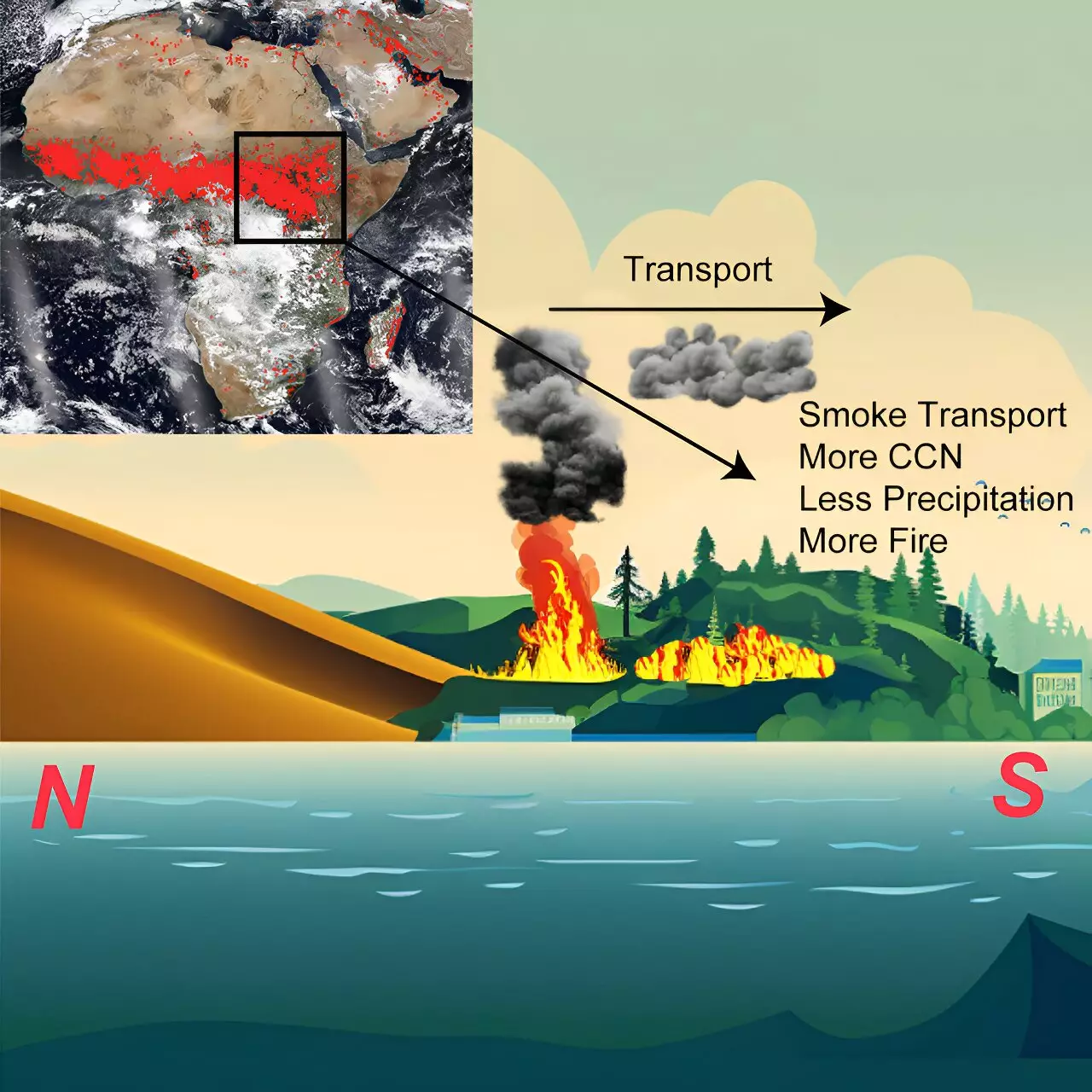Africa has been burning for thousands of years, and it shows no signs of stopping. In fact, the continent accounts for over 50% of the total area on Earth that is constantly engulfed in flames. This migrating, hemisphere-hopping wildfire season in Africa is steadily increasing, and it is creating a devastating feedback loop that feeds the fire and interacts with the climate. As aerosols, which are tiny particles with a significant impact on the Earth’s climate, are released into the atmosphere by the perpetual conflagration, they contribute to reinforcing wildfires and paving the way for even more elevated fire seasons in the future.
Aerosols play a crucial role in the regulation of African ecosystems and the impacts of fires and climate change in the region. While we are familiar with human-induced air pollution, such as brown smog, there are also natural aerosols, including salty sea spray, mineral dust, volcanic ash, and wildfire smoke. These suspended particles have a complex relationship with our climate. A recent study conducted by researchers at Georgia Tech sheds new light on the role of aerosols in the African wildfire life cycle and their long-term climate impact.
Traditionally, it was believed that aerosols had short-term, localized climate impacts and could be effectively removed by precipitation within a week. However, the study reveals that aerosols in Africa have a longer-term impact, extending over seasons. The unique alternation between dry and wet seasons along the equator enhances the lifespan of aerosols in Africa. With the combination of wildfires and fire-induced aerosols, their impact becomes more persistent.
The researchers utilized the Region-Specific Ecosystem Feedback Fire (RESFire) Model, developed by the Wang lab at Georgia Tech, to study aerosol feedback in Africa. This model enhances the existing Community Earth System Model (CESM), which is an open-source global climate model. By improving CESM’s fire simulation capability, the researchers were able to better understand the complex interactions between fire, climate, and ecosystems.
Aerosol Feedback Mechanism
The study uncovers the positive feedback mechanism between fire and aerosols in Africa. Aerosols absorb vapor from the atmosphere, reducing the growth of large cloud droplets, and ultimately affecting precipitation. Fire aerosols are transported from burning or dry regions to wet regions, resulting in reduced rainfall and drying of fuel loads. This feedback mechanism not only impacts the current fire season but also amplifies burning in the subsequent season.
Africa vs. Coastal Regions
Unlike coastal areas like the western United States, where fire smoke alters local fire weather, leading to positive feedback, Africa experiences a more intense and prolonged impact. The shifting fire regions and prevailing winds in Africa contribute to the persistence of the positive feedback mechanism, increasing the length and severity of the fire weather season. Over the past four decades, Africa has seen a 40% increase in its fire weather season, suggesting potential shifts in the distribution and variability of burned areas.
While the positive feedback mechanism in Africa may be self-sustaining and resilient in the face of current climate conditions, the presence of persistent global climate change raises concerns. As the Earth’s climate continues to change, it is unclear how the interaction between fire, aerosols, and climate will evolve. Understanding this dynamic is crucial for developing effective strategies to mitigate the impacts of wildfires and climate change in Africa and other regions prone to wildfires.
Africa’s perpetual wildfire season is a unique and escalating challenge. The role of aerosols in fueling and sustaining wildfires is a critical factor that researchers are starting to unravel. By studying the complex interactions between fire, aerosols, and climate, scientists can better comprehend the long-term consequences of wildfires and climate change in Africa and other wildfire-prone regions. This knowledge is essential for devising strategies to mitigate the devastating effects of these wildfires and safeguard the fragile ecosystems of the continent.


Leave a Reply